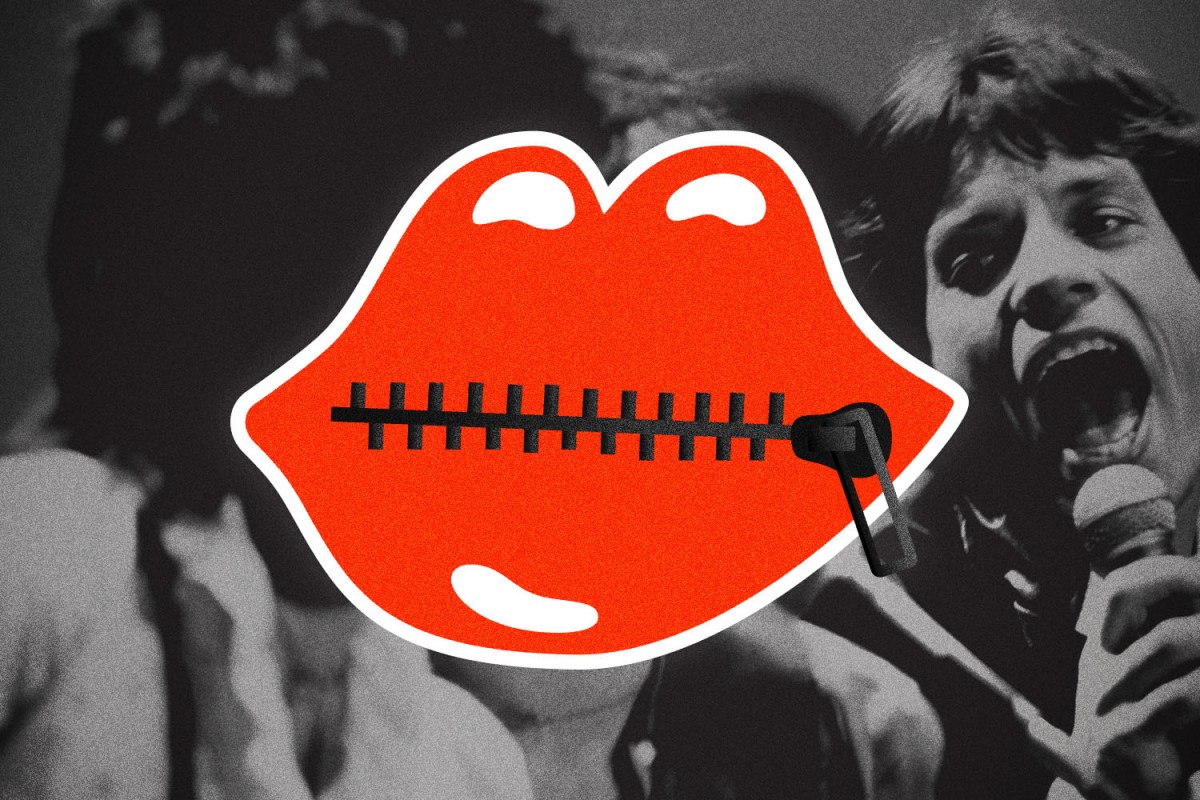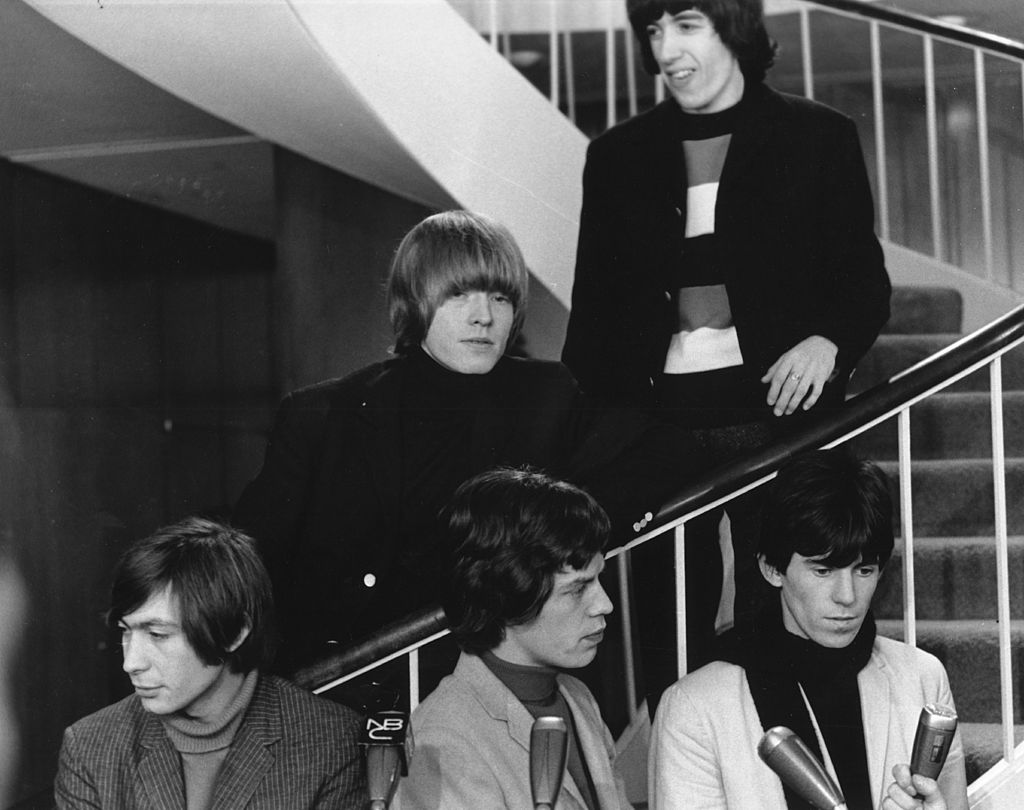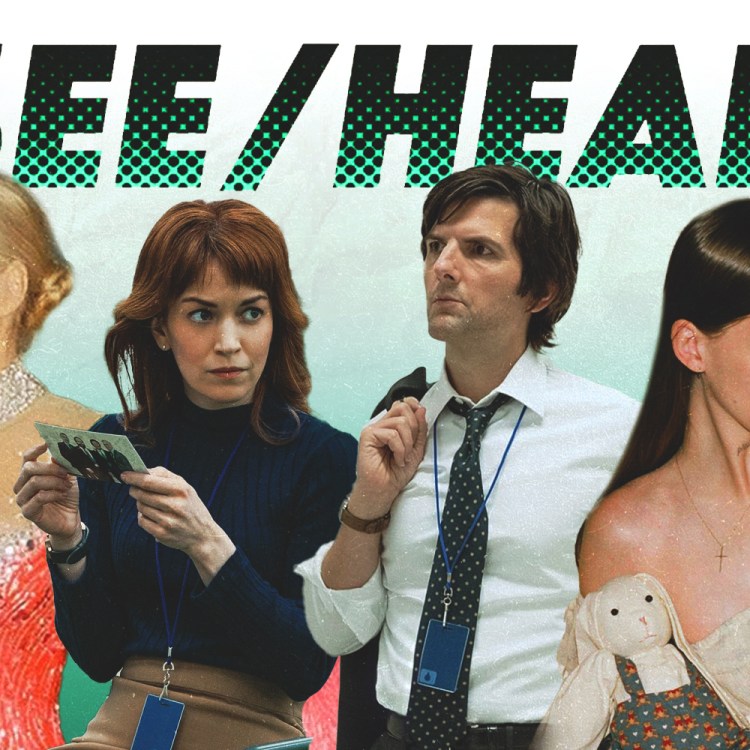If, for some reason, you weren’t able to pick up on the, uh … imagery behind its title, Sticky Fingers hits you over the head with it with its Andy Warhol-designed cover featuring a close-up of a man’s bulge and a working zipper that could be pulled down to reveal an image of cotton briefs. The Rolling Stones’ 1971 classic — which celebrates its 50th anniversary today — lets you know what the vibe is before you even pull it out of the sleeve, so in many ways it makes sense that it’s also the record that houses the band’s most controversial track, “Brown Sugar.”
What’s fascinating about “Brown Sugar” is that despite its clumsy lyrics and blatant fetishization of Black women, it remains one of the band’s most beloved tracks, a staple in their live shows. Fans who know better dance to it in spite of themselves. Maybe they laugh nervously at its lyrics, but they don’t turn it off. Like a lot of the Stones’ catalog, it’s a relic from another time, full of racism, sexism and other questionable lyrics that have aged poorly. But like the Stones themselves, it has endured.
Half a century later, Sticky Fingers stands as a microcosm of the Stones’ complicated legacy. On the one hand, it’s got some extremely regrettable moments like “Brown Sugar” and “You Gotta Move,” a blues number on which Mick Jagger puts on an embarrassing accent that has been described as “aural blackface.” But it also came smack dab in the middle of the group’s unparalleled run from 1968 to 1972 which saw them release Beggars Banquet, Let It Bleed, Sticky Fingers and Exile on Main St. in quick succession, and while its low points are extremely low, it’s also full of undeniable classics like “Can’t You Hear Me Knocking,” “Wild Horses,” “Dead Flowers” and “Moonlight Mile.”
It’s a tricky thing to navigate, particularly for the Stones fans who happen to be women or people of color. While we’re certainly not calling for the band to be “canceled” (whatever that even means) in 2021, we also would never begrudge anyone’s decision to stop listening to some of their songs that have aged like milk. The Stones are one of those rare bands who have hung on so long that their early output, deemed scandalous at the time, seems tame by today’s standards, while some of their other tracks whose problematic lyrics didn’t raise any eyebrows at the time are no longer considered acceptable. With that in mind, in honor of Sticky Fingers‘s anniversary, we’re looking back at some of the Rolling Stones’ most controversial tracks, whether they were simply an example of prudish censors getting worked up over nothing or misogynistic tracks that have rightly been retired from their setlist.
The songs that haven’t aged so well…
“Star Star” (1973)
The Stones’ raunchy ode to groupies — better known by its original title, “Starfucker,” which was nixed by Atlantic Records — isn’t exactly a flattering portrayal. Many pearls were clutched over its allusions to sex acts with fruit, lyrics like “I bet you keep your pussy clean” and celebrity gossip (“Yeah, Ali McGraw got mad at you for giving head to Steve McQueen”) when it was initially released. But nowadays, what’s most offensive about it is the casual sexism and the way it perpetuates its era’s view that the women (or, in many cases, young girls, but that’s a whole other can of worms) in rock stars’ orbits were nothing more than unfeeling, fame-hungry sex objects to be used and passed on to the next celebrity. Mick Jagger has defended the song in the past, claiming he was only writing about what he saw back in the day; to his credit, however, the Stones seem to have removed it from their setlist. They haven’t played it live since 2003.
“Brown Sugar” (1971)
“Brown Sugar” is easily the Stones’ most controversial track, and for good reason. It’s a song that tries to tackle a laundry list of objectively bad things — the slave trade, rape, heroin — but it does so without making a single coherent point about any of them, and it places them over an impossibly catchy guitar riff that makes the whole thing feel a little too glamorous, given the subject matter. (It feels weird to cheerily dance to lyrics like, “Gold coast slave ship bound for cotton fields/Sold in a market down in New Orleans/Scarred old slaver knows he’s doing alright/Hear him whip the women just around midnight,” right?) Add to that all the objectification of Black women tossed in by Jagger, and you’ve got a track that would never fly if it were released today. Jagger has admitted it’s not one of his best, claiming he wrote it in 45 minutes. “God knows what I’m on about in that song. It’s such a mishmash. All the nasty subjects in one go,” he told Rolling Stone in 1995. “I would never write that song now.” To their credit, the Stones have removed some of the more controversial lyrics from live performances, and they replaced the “just like a Black girl should” line with the still-not-great “just like a young girl should” should in subsequent recordings of the track.
“Some Girls” (1978)
“Some Girls” is based on a misogynist concept that recurs throughout the Stones’ earlier work — the idea that women are annoying gold-diggers who are only good for sex — but if that wasn’t bad enough, it adds a slew of racist stereotypes like “Black girls just want to get fucked all night, I just don’t have that much jam” and “Chinese girls are so gentle/They’re really such a tease/I never know quite what they’re cooking inside those silky sleeves.” After facing backlash over the song from the likes of Jesse Jackson after its release, Jagger insisted the song was meant to be a parody of men who actually hold those beliefs, and the band put out a formal apology: “It never occurred to us that our parody of certain stereotypical attitudes would be taken seriously by anyone who heard the entire lyric of the song in question,” it read. “No insult was intended, and if any was taken, we sincerely apologize.” Since then, it’s been a rarity in their live set (according to Setlist.fm, they’ve only played it live 41 times), and the last time they played it in concert, in 2015 at Atlanta’s Bobby Dodd Stadium, they omitted the line about “Black girls” entirely. (Interestingly, they still kept the equally bad lines about “Chinese girls” as is. Yikes.)
“Under My Thumb” (1966)
“Under My Thumb” is a horrifyingly sexist celebration of controlling and breaking down the will of a woman so that she “talks when she’s spoken to” and goes along with the narrator’s every demand. It likens her to a “pet,” a “Siamese cat,” and a “squirming dog,” and it includes infuriating double standards like “Her eyes are kept just to herself, I can still look at someone else.” Like with “Some Girls,” Jagger has insisted that “Under My Thumb” is meant to be parody. “It’s a bit of a jokey number, really,” he told Rolling Stone in 1995. “It’s not really an anti-feminist song any more than any of the others … Yes, it’s a caricature, and it’s in reply to a girl who was a very pushy woman.” Still, he’s tweaked it a bit since then, changing the references to the “girl” in its lyrics to “woman” in live performances.
“Stupid Girl” (1966)
This “Paint It, Black” B-side isn’t exactly heralded as the Stones’ finest work, and it’s easy to see why. The misogyny of “Under My Thumb” is dialed up to 11 here, and the result is basically a song with the same amount of nuance as a hand-painted “No Girlz Allowed” sign hung outside a kid’s treehouse. In that same 1995 interview with Rolling Stone, Jagger admitted that “Stupid Girl” is “much nastier than “Under My Thumb.” “Obviously, I was having a bit of trouble,” he said. “I wasn’t in a good relationship. Or I was in too many bad relationships. I had so many girlfriends at that point. None of them seemed to care they weren’t pleasing me very much. I was obviously in with the wrong group.” (Or maybe instead of being “in with the wrong group,” he was just being a dick to everyone!)
“Little T&A” (1981)
Keith Richards is responsible for this Tattoo You track on which he also sings lead, and you don’t exactly need a degree in gender studies to figure out how it objectifies women. (The titular — no pun intended — “T&A,” of course, refers to “tits and ass,” something that’s driven home by the line “‘She’s my little rock and roll/My tits and ass with soul, baby.) The Stones have made no apologies for it, and in 1981, Richards explained it thusly: “It’s about every good time I’ve had with somebody I’d met for a night or two and never seen again. And also about the shit that sometimes goes down when you just sort of bump into people unknowingly, and not knowing the scene you’re walking in on, you know? You pick up a chick and end up spending the night in the tank, you know?”
“I Go Wild” (1994)
“I Go Wild,” off of 1994’s Voodoo Lounge, tells the story of its narrator’s relationship with a “femme fatale,” and surprise, surprise, it’s full of some gross language about women. “And the doctor says you’ll be okay, and if you’d only stay away/ From femme fatales and dirty bitches/And daylight drabs and nighttime witches/And working girls and blue stockings/And dance hall babes and body poppers/And waitresses with broken noses, checkout girls striking poses/And politicians’ garish wives, with alcoholic cunts like knives,” Jagger sings. Insert eye-roll emoji here.
“Stray Cat Blues” (1968)
This Beggars Banquet cut is all about Mick Jagger’s desire to have sex with a 15-year-old groupie, something that would never in a million years be considered socially acceptable in today’s world but, it’s worth pointing out, was also still illegal when the song came out in 1968. Jagger, who was 25 at the time, tries to justify it in the song with lines like “it’s no hanging matter, it’s no capital crime,” and in the track’s grossest line, he insists that “I can see that you’re 15 years old/No, I don’t want your ID.” After it was released, Jagger actually changed the underage girl’s age to be younger in live performances on the band’s 1969 American tour, making her 13 instead of 15 to test the limits of public opinion. That must not have gone over very well, because it was scrapped from their setlist for decades after 1971 (save for two isolated performances in ’73 and ’76), and while it was briefly brought back on a 2002-2003 tour, the Stones haven’t touched it since.
“Short and Curlies” (1974)
Despite what the title would suggest, “Short and Curlies,” is not so much a song about pubes as it is about shaming a man for allowing a woman to have him “by the balls.” In many ways, it’s the spiritual sibling to “Under My Thumb.” The general idea here is still that women need to be controlled by men, not vice versa, and the guy who finds himself under the thumb of a lady is dismissed as “too bad” and “so sad.” Ian Stewart’s piano playing on this track isn’t enough to save it from its cringe-y lyrics.
“Hey Negrita” (1976)
“Hey Negrita” borrows heavily sonically from reggae and Latin dance music, and you’d think that someone who has spent many, many years being called out for appropriating Black music and objectifying Black women in particular would perhaps think twice before putting a Spanish word that translates to “little Black girl” into a song title. And yet here it is, allegedly inspired by Jagger’s pet name for his then-wife Bianca, a Nicaraguan woman. Still, shortly after it came out, it’s clear that Mick didn’t think it was his finest work lyrically: “I hate telling about it,” he said to Rolling Stone in 1976. “If I tell you what the song is about, will you put it in your own words? Okay: it’s about a South American whore, and the singer, a poor man, is trying to get her price down. ‘One last dollar / I’ve got my pride / I’ll cut your balls and I’ll tan your hide.’ A very deep subject, eh?”
…and the Stones songs that used to be shocking
“Let’s Spend the Night Together” (1967)
“Let’s Spend the Night Together” sounds almost innocent by today’s standards, but in 1967, it was a scandalous suggestion, and in order to perform it on the Ed Sullivan Show, the Stones famously had to change the titular line to “let’s spend some time together,” but Jagger added in exaggerated eye rolls with every “some time” and slipped a few “the nights” in there anyway during the performance, causing an infuriated Sullivan to ban the band from the show. (That “ban” lasted a whole two years.)
“Street Fighting Man” (1968)
Whether you lived through it or just learned about it in history class, you’re no doubt aware that 1968 was an extremely violent year, full of civil unrest, horrifying assassinations and high-profile clashes between protestors and police. Things got so bad that even the Rolling Stones, a band that so rarely gets political, had to take a stand in song. “Street Fighting Man” was released in the United States within a week of the violence at the 1968 Democratic National Convention in Chicago, and radio stations refused to play it because they were afraid it would incite further violence. Banning it from the radio didn’t do much to hurt its legacy, of course; nowadays, it’s considered a classic.
“Schoolboy Blues”/”Cocksucker Blues” (1970)
“Schoolboy Blues” (also known as “Cocksucker Blues”) is admittedly a bit of an outlier on this list because, unlike many of the others, it’s intentionally offensive. Jagger penned the song to stick it to his record label; in 1970, the Stones left Decca to start their own label, but Decca insisted they were owed one more single under the band’s contract. The Stones came back with the most explicit track they could imagine — one that asks “where can I get my cock sucked, where can I get my ass fucked?” and makes references to bestiality — knowing full well that Decca would be unable to release it. It’s never been officially released on any format, but bootlegs have made the rounds for decades now. And while this one’s more a tactical move to get out of a recording contract than it is an earnest songwriting attempt, it absolutely achieved what it set out to do.
“Honky Tonk Women” (1969)
“Honky Tonk Women” (also released as “Country Honk” on Let It Bleed) is full of suggestive lyrics that turned some heads back in the day, and the band played that up even more in their live show, famously performing it in front of giant, 60-foot inflatable women on their 1989 Steel Wheels tour. But while lines like “she blew my nose and then she blew my mind” aren’t as big of a deal as they were when it was initially released, the song is still apparently too scandalous to be performed in China. In 2014, Jagger announced onstage that the Chinese government had prevented the Stones from playing the song, telling the crowd, “About now we’d usually play something like ‘Honky Tonk Women,’ we played it last time we were here in 2006, but it’s been vetoed.”
“Sympathy for the Devil” (1968)
Much like how Bruce Springsteen’s “Born in the USA” frequently gets misinterpreted as a patriotic song, there were plenty of people who heard “Sympathy for the Devil” in 1968 and assumed it meant the Rolling Stones were worshipping Satan. Of course, it’s actually about all the horrors human beings inflict upon each other and the ways in which we’re more demonic than any mythical fallen angel, and since then, it’s also been frequently falsely identified as the song that was playing when Meredith Hunter was murdered by the Hell’s Angels at the Stones’ Altamont performance in 1969 — perhaps in an attempt to paint it as some sort of supernatural evil. (That dark distinction actually goes to “Under My Thumb.”)
“(I Can’t Get No) Satisfaction” (1965)
Nowadays, it stands as one of the most iconic tracks of all time, but censors were none too thrilled with the Stones’s tale of sexual frustration when it was released in 1965. Certain cities banned it on the radio even though its vocals were intentionally buried low in the mix in an attempt to sneak its lyrics past censors and get it airplay, and the group was not allowed to sing the line about “trying to make some girl” on a 1965 performance on ABC’s Shindig! But was it really song’s the sexual content they were so put off by back then, or was it perhaps the song’s anti-consumerism and the way the Stones seemed poised to shake up the status quo?
This article was featured in the InsideHook newsletter. Sign up now.























